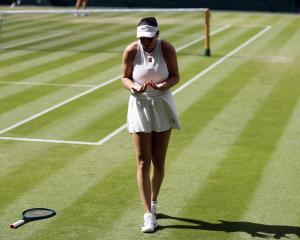It has been an interesting journey for the Taieri College old boy and University of Otago physiotherapy graduate.
Lawson (28) and Rosa Cooper (25), of Kaiapoi, have just arrived in the Netherlands, where they will be based in Nijeeven, to play for the DOS'46 club.
He believes they are the first New Zealand players to play in the country which gave birth to the obscure (in this part of the world, at least) hybrid of basketball and netball.
''There are only a handful of foreign players playing in the Dutch competition,'' Lawson told the Otago Daily Times in an email.
''Dos'46 is the largest korfball club in the region and one of the top clubs in the Netherlands.
''We will be playing through until April next year. I may also become involved with the medical team at the club as I am a physiotherapist by profession.''
Korfball is hardly mainstream in New Zealand but neither is it non-existent. It has a national organisation - Lawson is on the board - and a national championship, and the New Zealand korfball team (ranked 19th) hopes to qualify for the world championships.
The national side will next year play in the Asia-Oceania championships, a qualifying tournament for the 2015 world championships, so the spell in the Dutch heartland will be invaluable preparation.
''Rosa and I decided this would be a great opportunity for us to further our korfball and help New Zealand gain qualification for the world championships for the first time at any level,'' Lawson said
''For me, this is part of a four-year project that began after the 2010 Asia-Oceania championships in China.
"I was captain (and physiotherapist) of the New Zealand team that missed out on world champs qualification by one place.
''Prior to this, in 2007, my New Zealand under-23 side missed out on world youth championships qualification by one goal on countback.''
Lawson, an Otago Daily Times Class Act recipient in 2002, grew up in Mosgiel and did not encounter korfball until he was completing his tertiary studies in Christchurch in 2006.
The game appealed and he became player-coach of Canterbury in 2010, winning three consecutive national titles.
''Player numbers in New Zealand vary a lot,'' Lawson said.
''At any stage, there may be up to 400 players. In Christchurch, we have just started the first high schools competition, as well.''
Korfball is played officially in about 60 countries. The Dutch are perennial world champions, having only lost the title once, to Belgium.
''The sport is a big part of Dutch culture,'' Lawson said.
''Children grow up playing the sport and its popularity is somewhat similar to netball's in New Zealand.
''There are clubs in most towns and villages. Our story about coming here has already been in three local newspapers in the northern Netherlands.''
Korfball
At a glance
- "Korf'' is the Dutch word for ''basket''.
- Mixed-sex sport that has elements of basketball and netball.
- Invented in 1902 by Nico Broekhuysen, a Dutch teacher.
- Demonstration sport at the 1920 and 1928 Olympics, and part of the World Games programme.
- Played on a 40m x 20m court, divided into two square halves. The korfs (3.5m high, sort of a deep plastic tube) are situated 6.67m in from the baseline, allowing the game to be played 360 degrees around the korf.
- Teams consist of four males and four females. Two players of each sex are restricted to each half, and players are only allowed to defend opposition players of the same sex.
- Ball movement is similar to netball. Passing and shooting only, no dribbling or running with the ball. But there is no obstruction rule, so players can defend as closely as possible.












